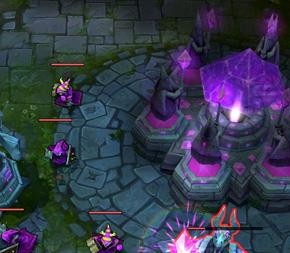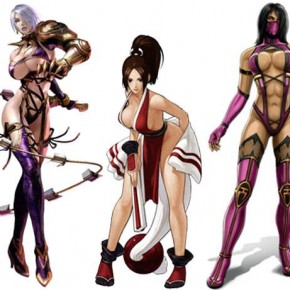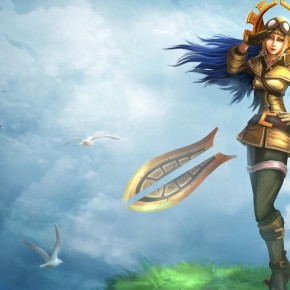League of Extraordinary Geeks?
- League of Legends Website
- Razor Ouroboros Gaming Mouse
- Oversexualized Video Game Women Photo: capcom-unity.com
- Irelia, a Believable Female Character Photo: League of Legends website
The Nest
The bed is unmade, simply a twisted mass of blankets and pillows. Packaging from processed foods litters the floor and mostly empty drinks dot every flat surface. Clutter is in every corner gathering dust by the day. Bits of this and that make up the kind of musty environment that is present today. The dingy, undecorated off-white walls are faintly lit from the glow of a 42-inch HD television streaming the image of the popular Massively Multiplayer Online Roleplaying Game(MMORPG) League of Legends from a desktop computer.
The Hive
The next room of interest is similarly cluttered and much more crowded. This one is a more public space, a living room adjoined to a kitchen. Inside this room, there is a blue patterned couch, a yellow armchair, a blue and brown desk chair, three tall wooden bar seats, a low wooden coffee table, a square wooden end table, and a black wooden chest. There are six laptops currently running and nearly every plug in the room is in use. Some are set up on the low coffee table in front of the couch and a couple are set up on the bar that separates the living room from the kitchen. Idle chatter is buzzing throughout the room; however, this will soon be replaced with the sound of frantic clicking and the occasional curse word. All six faces are now completely captivated by the images on their computer screens. They are now working toward a single objective: victory in the online game League of Legends.
The Game
As I watch, I wonder if this game is actually deserving of such undying devotion. They play for hours without any breaks. League does not have any sort of story, wouldn’t it get boring after a while? I am not new to video games, I have played them all my life, but I’ve never been so devoted to a single game before. Obviously, I am curious about many aspects of playing League. As a girl, will I be discriminated against? In my experience with online games, there has always been someone who is openly rude or demeaning toward me as soon as they became aware of my gender. As a result of this I opt for nondisclosure of my gender. Aside from my gender, the way I see League players is affected by other factors such as the fact that I am a college student. I think that this one will be more positive as it will allow me to relate better to other players, as most of them are within that age range.
I begin my journey into the world of League by downloading the game, which takes so many hours that I end up going to bed before it is even finished. With this out of the way, I take the next step by consulting the official League of Legends website for information and playing the tutorial. It’s actually pretty fun, so I decide to play a few more games with my friend, Michael. He connects us to a game with two of his friends who also play League and they all coach me through the games.
The game is more complicated than I originally thought; it requires quite a bit of research. The main goal is to destroy the enemy’s Nexus, or base. In order to do this you must destroy the towers and inhibitors that stand in the way, while also protecting your own.
The Nexus Photo: Official League of Legends Website
Each team is five human players, or the enemy team can be computer controlled for practice, and unlimited minions. The game is just a series of matches, all independent of each other. In each new match, the player starts fresh. Because of this, the game never actually has a concrete end. Before the match starts, each player chooses a champion(there are more than 100 of them currently) and each champion has their own unique abilities. Each match begins with every player at level one, so no person has any sort of advantage. Each player now builds their champion from the ground up by buying items with gold gained from killing enemies and strategically choosing which abilities to boost. Seeing as I know virtually nothing of these strategies, my friends tell me which items to buy and which abilities to use. I am very impressed by how knowledgeable my friends are about the many items, and no matter which champion I decide to try, they can always tell me exactly what to buy. This shows how much time and dedication League players put into the game.
The Equipment
Any devoted League player has very specialized equipment to make playing the game smoother. The dream setup is a very expensive computer and mouse built specifically with video games in mind; this is the kind Michael has. For those with less money, the expensive mouse is sufficient. The prices of these specialized mice range from $20 on the low-end all the way up to almost $300 on the high end. Personally, I think it is absolutely crazy to spend that much money on a mouse; however, to these gamers it is an investment. The better the quality of the mouse, the better they feel they will play. Having a better mouse allows players to increase the sensitivity making it easier to react faster and complete actions quickly. These specialized computer mice are also equipped with extra buttons which can be customized to do certain actions. Which actions are linked to these buttons are entirely up to the player and can be utilized in very strategic ways.
Razor Ouroboros Gaming Mouse Photo: pcmag.com
The Money
League of Legends may be a free to play game, but this does not mean that it brings in no revenue. The company that runs League, Riot Games, makes a significant amount of money by selling character customization. They sell skins for the champions, which is purely cosmetic, yet it still brings in more than enough money to make a profit. Obviously, these purchases will not affect the game play in any way other than aesthetically.
As my informant Michael puts it, “it’s not pay to win, it’s pay for flavor.” This flavor is what makes the game personal to each individual player.
Girls and the Game
Let me come back to one of my concerns: my gender. It is no secret that video games are not traditionally marketed toward girls. In fact, many girls are repelled by “video games [depictions] of female characters with cartoonish breasts and behaviors that are irritating to female players” (Mullen and Sublette 4).
Oversexualized Video Game Women Photo: capcom-unity.com
League has a wide variety of female characters, some admittedly with ridiculous female proportions; however, some are actually believable as females.
Irelia, a Believeable Female Character Photo: League of Legends website
Generally when a girl plays an online game she may hear phrases like “go make me a sandwich,” “get back in the kitchen where you belong,” and “are you sure you aren’t actually a twelve year-old boy?” One of the things I like about League is that there is no voice chat. This fact alone cuts down on opportunities for discrimination. Most players aren’t even aware of gender at all during the game. As I play the game, I experience no discrimination despite my obviously gendered username. There is only a single instance of gender discrimination that has been brought to my attention since I began my research, and it was appropriately handled. Michael says that his friend, who is a girl, was being assaulted with vicious comments from an opposing player purely due to her gender. The opposing player would not let up, so his team members did the right things and forfeited the game in order to end the altercation.
The Addiction?
Michael states that he plays seven to ten hours of League of Legends each week, however, I believe that this is an underestimate. Another acquaintance has admitted that he plays several hours each day. I find it very hard to understand how this is even possible; where does the time come from? There are so many other things that need to be done that I cannot imagine spending such a large portion of the day on a game. This leads me to believe that these players may be addicted to League. The study by Kuss, Louws and Wiers shows that “playing MMORPGs has been linked to addiction, as well as physiological consequences” Also, it has even been shown that “some players meet criteria similar to those for substance dependence” The reason that MMORPGs are so easy to become addicted to is the fact that they never end. There are always more things to do, and the more time you invest in it the deeper you get sucked in, leading to spending even more time on it. This is very apparent with League, you can always play another match. Players find all kinds of excuses for spending hours upon hours playing: “I did badly that game, I need to make up for it,” “We lost! I can’t stop playing on a loss,” and “I’m playing so well I just have to play another one.”
The consequences of a gaming addiction can be quite severe; it can cause things like depression, social phobia, and even death. One source cites that several people have “died of a pulmonary thromboembolism caused by sitting at the computer too long” (Sublette and Mullan 10:3-23). This same article also mentions studies that link aggressive behavior to online gaming addictions. Other research concludes that “gamers with longer weekly gaming hours tended to have a longer history of online gaming, and more severe depressive, social phobic, and internet addiction symptoms” (Wei 1). In addition to these issues “MMORPG’s specifically require a high time investment on behalf of the player” (Kuss, Louws, and Wiers 480). This proves an earlier point that I made about how players are sucked into spending more and more time playing the game. Spending this much time devoted to a game can take away from other responsibilities such as school, work, family members, significant others, and personal health.
Why Do They Play?
When it comes down to it, there has to be a reason why League holds so much importance in the lives of these gamers. I understand that fun and relaxation are important to maintaining good mental health, but these gamers take playing League a level beyond that. According to a study mentioned in Kuss’ article player motivations can be categorized into three components: achievement, social, and immersion. Another study categorizes reasons for gaming into four realms of experience: Entertainment, Esthetic, Escapist, and Educational(Pine and Gilmore, quoted in Lee and Park). The results of the study by Lee and Park reveal that “educational gratification[, characterized by active participation and absorption, is] the strongest factor explaining experiential gratification, which may be interpreted as showing that through playing online games, users learn how to respond strategically to situations.” This shows that the majority of gamers do actually gain something practical from all of the hours spent gaming.
Researchers can psychoanalyze gamers all they want, but I am out for the experience. I ask my informants why they play League and the answers are a bit mixed. Michael says that he plays League almost completely for friends. Others have a less modest reason; they like to brag about how good they are: they want to be the best. Overall, League seems to be a way for players to escape reality, they seem more confident and sure of themselves in game. I realize now that League has become a safe haven for those with certain interests, those who love to spend hours upon hours strategizing and practicing. It is a place where they can win and gain a sense of superiority. One thing that really sticks out to me is that every single player gets extremely upset about losses; they need to win to have fun. However, this can be dangerous as it leads them into the endless cycle of MMORPG addiction.
Works Cited
Jowon, Park, and Lee Guiohk. “Associations Between Personality Traits And Experiential Gratification In An Online Gaming Context.” Social Behavior & Personality: An International Journal 40.5 (2012): 855-862. SPORTDiscus with Full Text. Web. 12 Mar. 2014.
Kuss, Daria J., Jorik Louws, and Reinout W. Wiers. “Online Gaming Addiction? Motives Predict Addictive Play Behavior In Massively Multiplayer Online Role-Playing Games.” Cyberpsychology, Behavior & Social Networking 15.9 (2012): 480-485. Business Source Complete. Web. 12 Mar. 2014.
Sublette, Victoria Anne, and Barbara Mullan. “Consequences Of Play: A Systematic Review Of The Effects Of Online Gaming.” International Journal Of Mental Health And Addiction 10.1 (2012): 3-23. ERIC. Web. 12 Mar. 2014.
Wei, Han-Ting, et al. “The Association Between Online Gaming, Social Phobia, And Depression: An Internet Survey.” BMC Psychiatry 12.(2012): 92. MEDLINE with Full Text. Web. 12 Mar. 2014.
“What Is League of Legends?” League of Legends. Riot Games, n.d. Web. 10 Mar. 2014. <http://gameinfo.na.leagueoflegends.com/en/game-info/get-started/what-is-lol/>.




